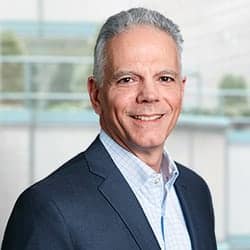When people hear I moved from BlackRock to Fintech iCapital Network, I see a fair number of raised eyebrows. On one hand, you have BlackRock, an established asset-management behemoth. On the other, there’s iCapital, a small, young Fintech company – so the transition seems curious to some. But for me, it was a natural evolution. To better understand it, all you have to do is look at the broader arc of my career.
Solving real-world problems with technology
I graduated from Columbia University with a degree in electrical engineering. My first job was designing computer chips for the telecom industry – a pure engineering role. A year later, I switched to the financial industry after realizing I wanted to use technology to solve real-world problems you could read about in the newspaper every day. This became an anchoring focus for my career: Using technology to solve tangible, real-life problems.
Later, I worked as a trader on the FX options desk at Chemical Bank (now J.P. Morgan Chase), where I built and deployed a successful data-driven arbitrage system. After a while, though, I got bored and came to another realization: My energy was best directed toward building the tools that solve problems, versus operating the tools.
I subsequently worked for Wall Street Systems, which was a Fintech company – we just didn’t call it “Fintech” back in the ’90s. At the 20-person start-up, I leveraged my technical programming skills and my understanding of how trading, operations, risk management and compliance fit together to develop fixed income and FX trading systems.
After moving to BlackRock, I held a variety of roles, including leading integration efforts after the company’s acquisitions of Merrill Lynch Investment Managers and Barclays Global Investors.
In my view, integration is the ultimate manifestation of technology, process and people coming together. To successfully integrate, you need to understand what people are doing, then take the existing tools and adapt them to support the new and developing needs.
So, what about iCapital? I was drawn back to an entrepreneurial, start-up environment. I feel that iCapital is in the right place at the right time, combining industry expertise with leading-edge technology to deliver an innovative solution. Throughout my career, I’ve benefited from the ability to marry together technology – knowing how it works and how to harness it – with the business of finance. Whether it’s FX trading, index equity portfolios, or alternatives, the ability to apply technology to create scale and transparency has served me well.
Myth-busting: What many people get wrong about the New York Fintech scene
It’s easy for people who are curious about my transition (and Fintech in general) to think Fintech firms are filled with a bunch of 30-something Silicon Valley guys who have built a vaguely understood tool. Plus, they think the whole landscape is driven by founders’ egos.
In reality, the New York Fintech scene is quite different. Management is more mature: a lot of us have come from established careers with Wall Street firms. In fact, it’s almost the exact opposite of what you see on TV. Much of the industry is being built by people who have expertise in using technology to solve specific problems within the traditional financial services industry.
[clickToTweet tweet=”In reality, the New York #Fintech scene is quite different. Management is more mature: a lot of us have come from established careers with Wall Street firms. In fact, it’s almost the exact opposite of what you see on TV” quote=”In reality, the New York #Fintech scene is quite different. Management is more mature: a lot of us have come from established careers with Wall Street firms. In fact, it’s almost the exact opposite of what you see on TV”]
Who thrives in a start-up Fintech environment?
Fintech can be an ideal environment for people like me, who love variety and are always asking, “Why?” Because you’ll have access up and down the organizational structure, small Fintech firms present an incredible opportunity for voracious learners who want to see the bigger picture. Plus, the start-up ecosystem is an excellent arena in which financial services veterans can use their experience and perspective to add immediate value.
If you’re moving from a bigger buy-side firm to a smaller Fintech company, you’ll need to be prepared to do almost anything that needs to get done; the roles are much less structured. Candidly, there’s no hierarchy in the smaller Fintech firms because there aren’t enough people to create one. In my experience, financial and technology professionals who have a genuine desire to create something that helps clients succeed – and value the freedom of a collaborative, de-compartmentalized culture—are ideally positioned to thrive in Fintech.
[clickToTweet tweet=”If you’re moving from a bigger buy-side firm to a smaller #Fintech company, you’ll need to be prepared to do almost anything that needs to get done; the roles are much less structured” quote=”If you’re moving from a bigger buy-side firm to a smaller #Fintech company, you’ll need to be prepared to do almost anything that needs to get done; the roles are much less structured”]
 Tom Fortin is the Chief Operating Officer at iCapital Network, a financial technology platform that democratizes access to alternative investments, such as private equity and hedge funds, for high-net-worth investors and their advisors. Tom was a Managing Director at BlackRock from 2001-2017. He was most recently the Global Head of Retail Technology where he was responsible for the strategy, design, and development of BlackRock’s retail sales enablement and digital distribution solutions. In addition he was a member of BlackRock’s Global Operating Committee, Human Capital Committee and Enterprise Risk Management Committee. Prior to joining BlackRock in 2001, Tom spent ten years with Wall Street Systems in the design, development and implementation of a front-to-back integrated fixed income and FX trading system for global financial institutions. Tom earned a BS degree in Electrical Engineering from Columbia University and a BS degree in engineering from Providence College, and an MBA degree in Finance from New York University.
Tom Fortin is the Chief Operating Officer at iCapital Network, a financial technology platform that democratizes access to alternative investments, such as private equity and hedge funds, for high-net-worth investors and their advisors. Tom was a Managing Director at BlackRock from 2001-2017. He was most recently the Global Head of Retail Technology where he was responsible for the strategy, design, and development of BlackRock’s retail sales enablement and digital distribution solutions. In addition he was a member of BlackRock’s Global Operating Committee, Human Capital Committee and Enterprise Risk Management Committee. Prior to joining BlackRock in 2001, Tom spent ten years with Wall Street Systems in the design, development and implementation of a front-to-back integrated fixed income and FX trading system for global financial institutions. Tom earned a BS degree in Electrical Engineering from Columbia University and a BS degree in engineering from Providence College, and an MBA degree in Finance from New York University.



